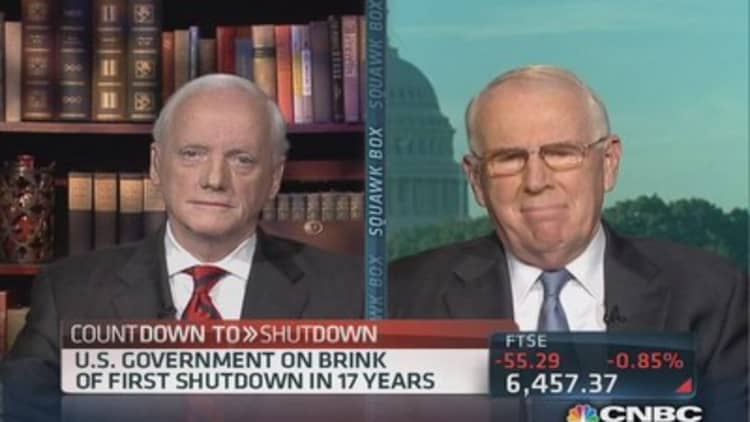Seems like the only way to avoid a U.S. government shutdown is for the House to accept a bill extending government funding at current levels through November 15...in other words, a "clean" bill.
Of course, if you believe in checks and balances, all this fighting over spending is good news. This of course is just a warm-up for the debt ceiling debates that are coming. A debt default, however, is a different animal completely. That would almost certainly result in higher interest rates and lower economic growth.
What, me worry? The last government shutdown in 1995-1996 did little to hurt the markets, so the same thing has to happen again, right?

Over the weekend, there were plenty of trader commentary passed around noting that during the last shutdown, in 1995-1996, the market was shut twice for a period of about three weeks. During the first shutdown, from November 13th to November 19th, the S&P 500 was up about 1.2 percent. During the second shutdown, from December 15th to January 6th, the market initially fell, but ended essentially unchanged.
Markets seem to believe that the same thing will happen. While the S&P 500 may be down 15 points, volume is still light.
I said last week that I think the markets are underestimating that the fight over the budget could merge with the fight over the debt ceiling --and become one giant mess. The markets are not pricing in any prolonged conflict, and that is dangerous.
While the Fed and the FDIC would remain open, as would Fannie Mae and Freddie Mac (both are private agencies, technically) other government agencies involved in financial matters may not be.
It's not clear how long the SEC would remain open-- some "essential" functions like monitoring of markets would certainly continue. But IPO reviews would almost certainly cease, as would most enforcement actions. The SEC's plan for a shutdown is here.
Large parts of the CFTC may also shut down. The CFTC has said only about four percent of its employees were essential, so while market surveillance will continue, it will likely be curtailed and any work on policy issues would come to a halt.
1) Meanwhile, crude oil is at a three-month low. You can blame it on weak demand, but it also dropped when President Obama and Iranian President Hassan Rouhani spoke on a phone call on September 27.
Global markets all lower, with the ending down 2.1 percent, but most Asian markets were down one to two percent; China's was the only major market up.
Most of Europe is down one percent, but Italy down 1.9 percent as ministers in Silvio Berlusconi's party resigned over the weekend from Italy's coalition government. Not clear if the Italian government can survive, lots of talk that snap elections may be coming early next year. Italian Prime Minister Enrico Letta said he would go before parliament on Wednesday for a confidence vote.
2) Cooper Tire rallies as shareholders are expected to approve the company's $2.5 billion sale to India's Apollo Tyres today. Shareholders are set to receive $35 per CTB share. The company gained more than three percent premarket, trading at $31.
—By CNBC's Bob Pisani


